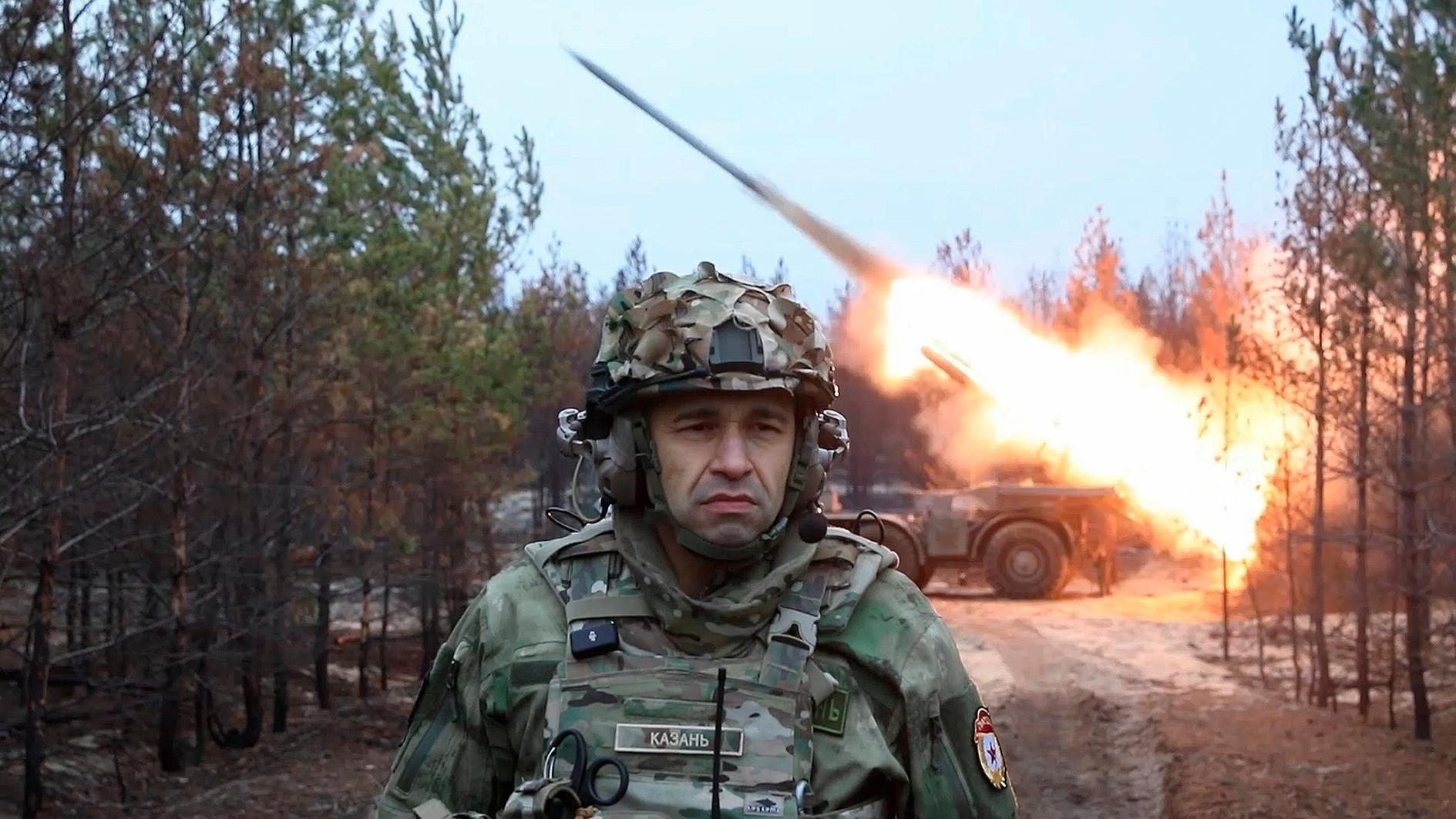
In this photo released by Russian Defense Ministry Press Service on Tuesday, Nov. 19, 2024, a Russian Uragan self-propelled multiple rocket launcher fires towards Ukrainian positions from an undisclosed location in Ukraine. (Russian Defense Ministry Press Service via AP)
Ukraine said Tuesday that its forces would never surrender to Russia, 1,000 days after Moscow launched its brutal invasion, while the Kremlin also pledged victory and escalated its nuclear saber-rattling.
The grim anniversary opened with an overnight Russian strike in the eastern Ukrainian region of Sumy that gutted a Soviet-era residential building and killed at least nine people, including a child.
President Volodymyr Zelensky published images of rescue workers hauling bodies from the debris and called on Kiev's allies to "force" the Kremlin into peace.
The foreign ministry echoed Zelensky's comments in a statement marking the anniversary by calling on allies to ramp up their military support to bring about a "sustainable" end to the war.
"Ukraine will never submit to the occupiers, and the Russian military will be punished for violating international law," the ministry said.
"We need peace through strength, not appeasement," the ministry added, referring to growing calls for Ukraine to sit down at the negotiating table with Russia to end the war.
The Kremlin also vowed to defeat Ukraine.
"The military operation against Kiev continues ... and will be completed," Kremlin spokesman Dmitry Peskov told reporters, using Russia's preferred language for its invasion.
The comments came as Russian President Vladimir Putin signed a decree broadening the scope for when Moscow will consider using nuclear weapons in a clear warning to the West and Ukraine.
"Aggression by a non-nuclear state with the participation of a nuclear state is considered as a joint attack," Kremlin spokesman Peskov said.
"It was necessary to bring our principles in line with the current situation," Peskov added, calling the update a "very important" document that should be "studied" abroad.
Russia "has always viewed nuclear weapons as a means of deterrence," he said, adding that they would only be deployed if Russia felt "forced" to respond.
Putin has issued a string of nuclear threats throughout the almost three-year campaign against Ukraine, triggering concern in the West over rhetoric it has slammed as reckless.
The new doctrine also allows Moscow to unleash a nuclear response in the event of a "massive" air attack, even if it only uses conventional weapons.
When the Kremlin first unveiled the proposed changes in September, Peskov called it a "warning" against anybody who was thinking about participating "in an attack on our country by various means, not necessarily nuclear".
Moscow's nuclear umbrella will also be extended to its close ally Belarus under the new doctrine.
Speaking on the 1,000th day of the conflict, Peskov said the "collective West" had unleashed a "war" against Russia, pledging that Moscow would see what it calls its "special military operation" through to the end.
Deadly dorm strike
The Kremlin says the move, which enables Russia to use nuclear weapons against a non-nuclear state if they are supported by nuclear powers, was "necessary to bring our principles in line with the current situation."
It comes just after the United States gave Kiev permission to use long-range missiles to strike military targets inside Russia.
The EU's outgoing top diplomat, Josep Borrell, pressed member states Tuesday to align with Washington in allowing Kiev to strike inside Russia using donated long-range missiles.
A Russian attack in Sumy hit a dormitory in the town of Glukhiv, which had a pre-war population of around 30,000 people and lies just 10 kilometers (six miles) from the Kursk region in Russia, where Ukrainian troops captured swathes of territory after launching a major ground offensive in August.
The drone attack killed nine people, including a child, the emergency services said, adding that four people were likely under the rubble.
In total, Kiev said that Russia had launched 87 drones over Ukraine during the night, and that 51 were shot down.
The strike on Sumy comes just days after another Russian aerial bombardment in the border region killed 12 people and wounded 84.
'Chronic' Russian violations
A separate missile strike on Monday on the UNESCO-protected city of Odesa in southern Ukraine left 10 dead and 55 wounded.
Ukrainian forces have steadily been losing ground in the Kursk region and have warned that Russia has amassed a force of some 50,000 troops, including North Korean forces, to retake the region.
The anniversary of Russia's invasion—launched on Feb. 24, 2022—comes at a perilous time for Ukrainian forces across the front, particularly near the war-battered cities of Kupiansk and Pokrovsk.
Ukraine has accused Russian forces of deploying banned chemical substances to advance and on Tuesday urged its allies to respond to a report by the Organization for the Prohibition of Chemical Weapons (OPCW) watchdog that said it had found banned riot control gas in Ukrainian soil samples from the front line.
"Russia's use of banned chemicals on the battlefield once again demonstrates Russia's chronic disregard for international law," the foreign ministry said.